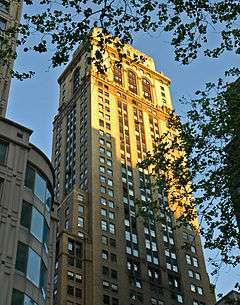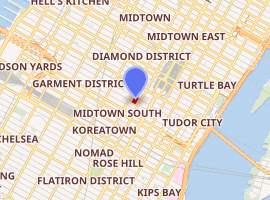10 East 40th Street
10 East 40th Street or the Mercantile Building is a skyscraper located in the Midtown Manhattan section of New York City, between Fifth Avenue and Madison Avenue, taking the width of the block between 39th and 40th streets. Designed by Ludlow and Peabody and built by Jesse H. Jones, it was finished in 1929 and is an example of Renaissance Revival architecture.[2] When it was built, it was the fourth-tallest tower in the world.[3]
| 10 East 40th Street | |
|---|---|
 10 East 40th Street from the New York Public Library Main Branch | |

| |
| Alternative names | Mercantile Building |
| General information | |
| Status | Complete |
| Coordinates | 40°45′06″N 73°58′53″W |
| Completed | 1929 |
| Renovated | 2002 |
| Height | 632 feet (193 m) |
| Technical details | |
| Floor count | 48 |
| Floor area | 350,000 sq ft (33,000 m2) |
| Design and construction | |
| Architecture firm | Ludlow and Peabody |
| References | |
| [1] | |
It was previously known as the Chase Tower, after its first tenant, Chase Brass & Copper. Its owner until his death in 1938 was Frederick William Vanderbilt.
It is 632 feet (193 m) high, with 48 floors, and contains 350,000 sq ft (33,000 m2) of office or mixed-use space.[2] It is tied with The Langham, New York Hotel as the 104th tallest building in New York. In September 2002, the building's lobby was renovated, restoring the 15-foot (4.6 m) ceilings.
Current tenants include the Moroccan consulate.
Last building on the direct current grid
On November 14, 2007, the building became the final site to be removed from Thomas Edison's original direct current grid in New York City.[4]
The building was completed in 1929 when 90 percent of the electricity in lower Manhattan was direct current.[5] In that year New York Edison announced plans that it was going to convert the entire system to alternating current. The last 2 rotary converter substations generating direct current (at West 26th and West 39th Street) were retired in 1977 and the DC conversions were handled by solid-state rectifier units. The 2007 event shifted the responsibility for providing the conversion from Con Edison to the building via a local converter. Many of the buildings built in 1929 and before still use direct current with the local converter – most notably for elevators. The New York City Subway's third rail electric system is still direct current (with the Metropolitan Transportation Authority providing the local converters from AC to DC.[6]
References
- "10 East 40th Street". CTBUH Skyscraper Center.
- "Mercantile Building". Emporis.com. Retrieved July 12, 2008.
- "World's tallest buildings in 1930" (PDF). Archived from the original (PDF) on December 26, 2010.
- Lee, Jennifer 8. (November 14, 2007). "Off Goes the Power Current Started by Thomas Edison". New York Times. Retrieved September 4, 2009.
- http://magazine.ieee-pes.org/mayjune-2013/history-8/
- http://magazine.ieee-pes.org/novemberdecember-2013/history-10/
External links
| Wikimedia Commons has media related to 10 East 40th Street. |